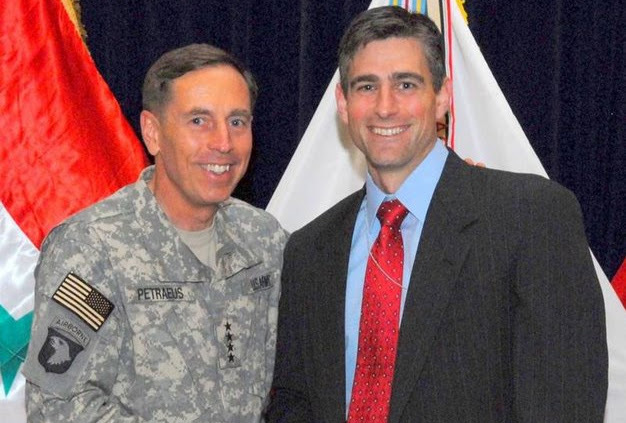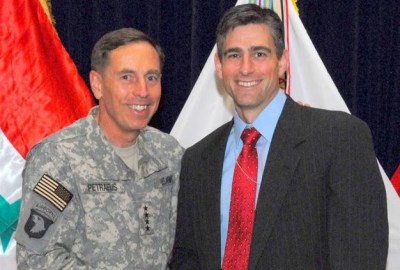“I’m not running for president,” says the current treasurer of Spokane County, Washington. “But if I were running for president, my inaugural speech would be: ‘Hey, Congress—take your balls out of the jar on the shelf and do your job.’”
If things go his way, Spokane County Treasurer Michael Baumgartner will have a chance to give the House of Representatives a nudge from the inside: In the long tradition of county treasurers everywhere, he is not running for president—but he is running for the House seat being vacated by Rep. Cathy McMorris Rodgers, currently chair of the Energy and Commerce Committee and former chair of the House Republican Conference. McMorris Rodgers’ pending departure presents an unexpected opening in a friendly district for Washington Republicans. Baumgartner is one of eight Republicans and four Democrats in the mix for the seat.
Baumgartner and I are slightly connected through some mutual friends. But I haven’t called him to talk at length about Republican congressional politics, a subject that is almost too depressing and too ghastly to think about for more than an hour at a time. I’ve called to get his views on the comparatively chipper subject of the fentanyl trade, the organized crime behind it, and the geopolitics behind the organized crime. Before he was struggling his way through Washington state politics (he is a former state senator and lost a U.S. Senate election to Maria Cantwell in 2012), he was an important figure in the State Department, working closely with Gen. David Petraeus and Ambassador Ryan Crocker (another son of Washington state) during the U.S. military surge in Iraq, having previously cut his teeth on Middle East issues working for the crown prince of Dubai in an effort to “turn Dubai into Singapore,” as Baumgartner puts it. In Afghanistan, he was a contractor, working on a wide range of issues that included counterinsurgency and counternarcotics work. Going from the apparent success of the surge to the apparently hopeless mess of Afghanistan was eye-opening.
And now, back home in Washington, he walks to work past vagrants camping under highway underpasses and zombied out on fentanyl or some other mind-numbing substance. And he sees the need for another kind of counterinsurgency program.
“I do think we have to look at the total drug trail,” he says. “It’s not just law enforcement. But a counterinsurgency paradigm is appropriate, whether you’re talking about cocaine in Colombia and Bolivia or the precursors to fentanyl that come from China and feed into the drug gangs that bring them forward.” What he means isn’t exactly the classical Reaganite militarized “war on drugs” model, but rather a combination of enforcement and interdiction with capacity-building for governments abroad and dealing with the demand side of the problem at home, an “in-depth, multifaceted strategy, similar to how we looked at Islamic terrorist networks, to get at the drug problem.”
He cites the legalization arguments put forward by conservatives such as William F. Buckley Jr. and says that he still takes a basically libertarian view of marijuana legalization—while appreciating some complications. For one thing, formal legalization efforts (not only of marijuana but of other drugs) next door in Oregon have produced less-than-encouraging results, as did the longstanding de facto legalization policy of non-enforcement in much of Washington state, in part because these efforts coincided with a general turn away from street-level law enforcement in the wake of the George Floyd riots. Having drugs consumed privately at home is a very different outcome from having drugs consumed openly by vagrants and semi-vagrants illegally camped in urban tent cities.
His stated support for marijuana legalization has been an issue in earlier campaigns. He supported Washington’s marijuana-legalization proposal, Initiative 502, when running for the U.S. Senate in 2012, a departure from many other Republicans as well as from his Democratic opponent, who ultimately won the race.
“At the time, I was very much of the Buckley view that persistent demand was going to be fed by legal or illegal markets,” he said. “I am a little disappointed at how marijuana has impacted Washington state. I’m interested in the spread between the black-market rate and the licit rate, what teenage use rates are going to be. Because of federal prohibition, we didn’t have much good science or data. There have been more significant health impacts than we knew of ahead of time, and the potency is higher and higher.”
Baumgartner still favors legalization, but with restrictions. “We should redirect a lot of funding toward education about the health costs of regular, potent marijuana use and programs to keep it away from children. It shouldn’t be in public spaces,” he said. “It’s off-putting to me when you smell it in parks and other places where it is technically prohibited, but, in the post-George Floyd era, we don’t enforce basic laws.”
While the district he seeks to serve runs up to Canada, Baumgartner makes a persuasive case that getting control over the southern border should be the No. 1 national political priority.
“The most critical issue of all national policy right now is border security, which means more than building a physical wall. We have to have control of the borders, and the drug piece is very much a part of that.”
But there are bigger policy issues, too. “My wife and I have helped several of our Afghan team members, who were part of our war fighting effort and who truly fit into our definition of refugee and asylum seekers, and got a few of them here,” he continued. “I feel very strongly about helping people in those situations get to America, but our asylum and refugee process is being abused right now.” Baumgartner argues for investing in a more productive relationship with Mexico. “We can’t look at Mexico as a one-off issue. It’s our most important border, frankly a more important neighbor than Canada in that it is more consequential when it comes to challenges for immigration, for drug policy, for energy policy, agriculture, trucking—all these are important issues with Mexico.”
He can be scathing on the subject of “radical left” district attorneys in Democratic strongholds, the Biden administration’s border policies, that sort of thing. And while he says he supported Tim Scott in the Republican primary, he has admiring things to say about Donald Trump, too, and says he will support him in the general election. But Baumgartner is a funny kind of populist.“I’m Eastern Washington through and through,” his campaign literature declares. The proof? “I was born in the Palouse and went to WSU.” True enough. He also went to graduate school at Harvard (and taught there as a teaching fellow), speaks French, and knows his way around Dubai. The first political thinker he references is William F. Buckley Jr., not Tucker Carlson. I press him about Trump, January 6, the attempt to nullify the 2020 presidential election, etc., and he miserably makes the noises a Republican hoping to win an election in 2024 is expected to make.
It is a no-win situation: He doesn’t make a particularly convincing Trumpist, but he’s willing to be enough of a Trump water-carrier that he is out of bounds for people who simply will not support a politician or a party that cannot say plainly that Donald Trump tried to stage a coup d’etat by attempting to nullify the 2020 presidential election so that he could illicitly hold on to power. About January 6 and the 2020 presidential election, Baumgartner says: “It would be extremely helpful if we would look forward and not have to talk about them a lot.” Politically, sure—many Republicans don’t want to talk about that, and the ones who do aren’t winning a lot of elections. But Republicans do have to talk about it. There isn’t any way for them to move forward until they do. And some of them do talk about it–often: Donald Trump, for one, routinely pleads the case of the January 6 “hostages” and “patriots.”
Washington state has a goofy top-two primary system, in which all the candidates of all the parties appear on the same primary ballot in August, with the top two finishers then facing off in the general election. The Cook Political Report puts the district, which is fairly conservative, at R+8. So Baumgartner’s real competition at the moment is going to be the rest of the Republicans in the field. If he’s successful, he’ll face the much harder tasks of trying to wade through an endless bog of Republican dysfunction and take that jar he mentioned down off the congressional shelf—if he can reach it.






Please note that we at The Dispatch hold ourselves, our work, and our commenters to a higher standard than other places on the internet. We welcome comments that foster genuine debate or discussion—including comments critical of us or our work—but responses that include ad hominem attacks on fellow Dispatch members or are intended to stoke fear and anger may be moderated.
With your membership, you only have the ability to comment on The Morning Dispatch articles. Consider upgrading to join the conversation everywhere.